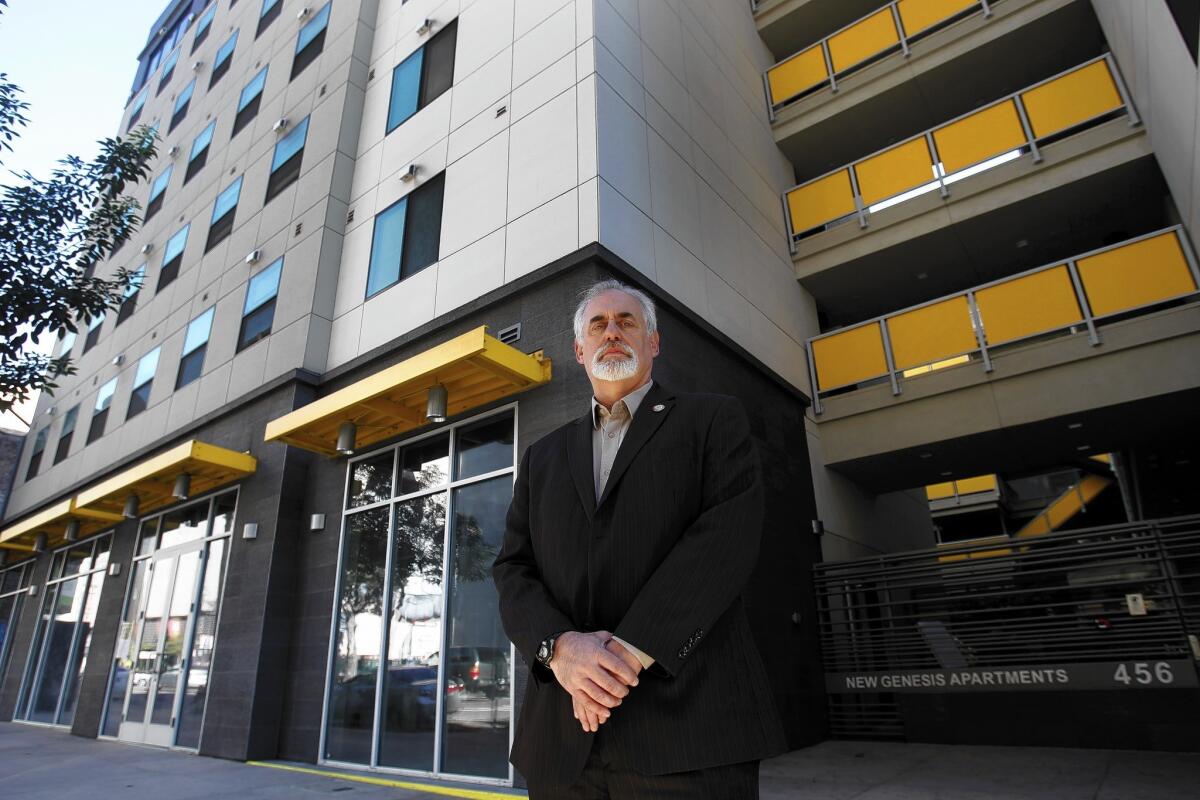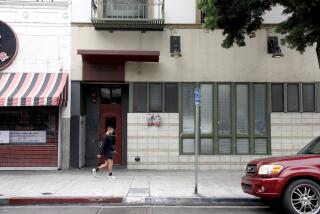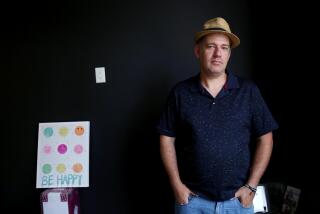Plans for skid row restaurant concern some residents

When the stylish New Genesis Apartments opened last year on skid row, residents and advocates were pleased that the project would provide housing for dozens of homeless people, as well as support services aimed at tackling addiction and mental illness.
In a neighborhood where rapid gentrification has brought $145 sushi and brow waxings to skid row’s historic core, the mixed-use project was seen as a rare opportunity for homeless people to live side-by-side with artists and other renters as they work to rejoin society.
A storefront restaurant serving beer and wine was the last thing many wanted to see in the complex — especially because the developer, the Skid Row Housing Trust, is a nonprofit dedicated to helping the homeless.
The housing trust’s alcohol permit application, a normally mundane process, has mushroomed into a symbolic fight for the soul of skid row.
“You would blatantly disregard the residents … who lived downtown prior to the gentrification process,” Yvonne Autry, a skid row resident, said at a City Hall zoning hearing this month, where many speakers opposed the permit.
Kevin Michael Key, a member of the Downtown L.A. Neighborhood Council, threatened to sue if the permit goes through.
“We’ve seen a divide between groups of people who see the revitalization of downtown in purely financial terms,” Key said. “Others see revitalization in terms of human lives.”
Chanting “No Wine, No Beer, Not Ever, Not Here,” protesters demonstrated outside the apartment building at the intersection of Fifth and South Main streets.
“It is absolutely torture to have an alcohol facility in a place where people are being rehabbed,” said Cue Jean-Marie, a skid row pastor. “This is not just a place where homeless live. It’s a community where respectable individuals live … and we’ve had enough.”
Supporters of the alcohol permit say the restaurant will help the ongoing improvement of the neighborhood, and will not affect residents. They point out that there are plenty of establishments nearby that already serve alcohol, and that there would be no access to the restaurant from inside the apartment complex.
Mike Alvidrez, executive director of the Skid Row Housing Trust, said New Genesis is taking homeless people out of the shadows and integrating them into the changing community.
“We like to think about downtown as one downtown,” he said.
The restaurant, a brick-and-mortar version of a food truck specializing in meatballs and called Great Balls on Tires, is on hold while the permit is being considered. Alvidrez said the community wanted a late-night restaurant to light up the street and bring more visitors to the block, and that alcohol is crucial to its success.
People on skid row can get booze anywhere, including at the Italian restaurant next door to New Genesis, he said. Alcoholics who fuel up on $1.50 cans of Colt 45 are unlikely to sit down for a meal, he suggested.
Several residents said they benefit from rubbing shoulders with more fortunate folk.
“You can take the ideas from the ‘normies,’ as we call them, see what the other half lives like,” said Michael Bush, 61, a formerly homeless man who went through substance abuse recovery years ago.
San Francisco and New York City have put beer and wine restaurants in homeless housing projects with no trouble, advocates said.
The Heartland Brewery and Chophouse has operated since 2001 on the ground floor of a Times Square hotel for seniors coming out of the city’s shelter system.
“The presence of a bar or restaurant is not going to make a person’s issues any more or less troublesome,” said Daniel Gillcrist, executive director of Project Find, which runs the hotel.
Skid row is home to 10,000 people, more than half living in the streets or shelters, in group homes and residential treatment centers, according to 2010 census data. Others occupy apartments, lofts or single-room occupancy hotels. Skid Row Housing Trust runs 23 renovated hotels and buildings for chronically homeless and disabled people.
The area took shape partly due to a decades-long city policy of “containment” of homeless people on the east side of downtown. It is crammed with social services, including substance abuse programs and sobriety meetings — 80 by one resident’s count.
“Let us heal, please, let us heal,” Silvia Hernandez, a formerly homeless resident, said at the zoning hearing.
Some opposition to the license goes beyond the recovery issue. The apartments’ grand opening drew demonstrators protesting the inclusion of moderate-income renters, who they said will eventually force out homeless people, especially the unruly mentally ill.
“A restaurant for ‘uptowners’ will result in the poor Genesis residents being pushed off the sidewalk in front of their apartment building,” said longtime skid row advocate Alice Callaghan, one of the protesters.
Opponents also criticized the housing trust’s initial bid for a full liquor permit, which was turned down in March.
At the zoning hearing, the agency lined up support from downtown business interests, City Councilman Jose Huizar, the downtown neighborhood council and a smattering of residents.
“Skid row is changing,” testified T.D. Osborne, the “resident ambassador” from the nearby St. George Hotel. “This will integrate us.”
Associate Zoning Administrator Maya Zaitzevsky, who promised to rule by Jan. 6, concluded the hearing by saying: “I’m sorry this is such a divisive issue.”
Great Balls on Tires principal Clint Peralta was unnerved by the acrimony.
“This issue, I would never have thought it would spiral into all of this,” said Peralta, an L.A. native who said he saw locating his restaurant on skid row as a “social mission.”
“I just want to give back to the community,” he said.
More to Read
Sign up for Essential California
The most important California stories and recommendations in your inbox every morning.
You may occasionally receive promotional content from the Los Angeles Times.










